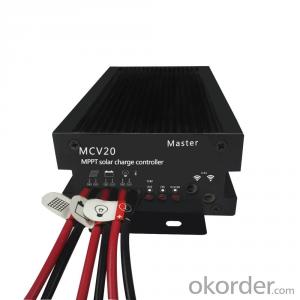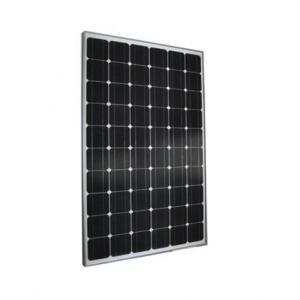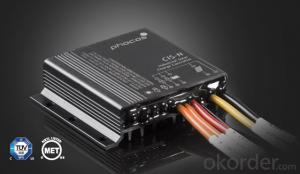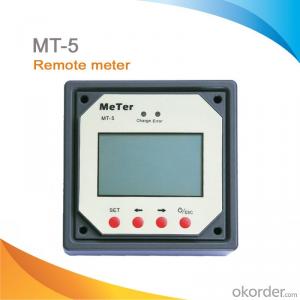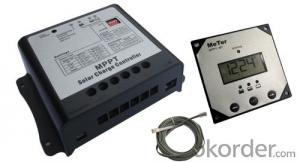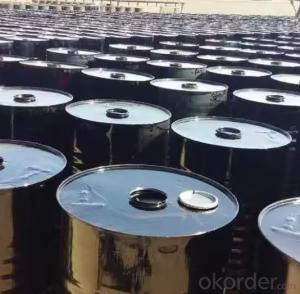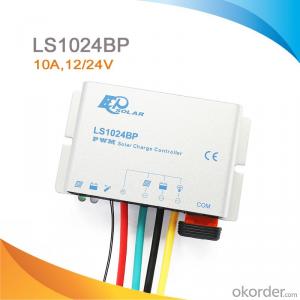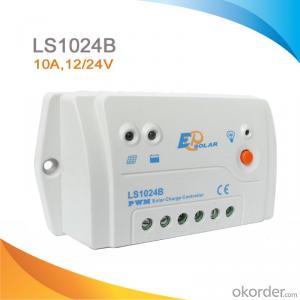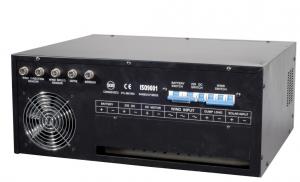Intelligent 12V 24V Inverter Charger MPPT Solar Battery Charger Controller with Temperature sensor
- Loading Port:
- China main port
- Payment Terms:
- TT OR LC
- Min Order Qty:
- 1 pc
- Supply Capability:
- 10000 pc/month
OKorder Service Pledge
OKorder Financial Service
You Might Also Like
1.Features :
1). Professional design to promote system reliability
2).High MPPT tracking efficiency up to ≥99.9% and high system efficiency up to 98%, Maximizes solar panel power output & reduces system costs.
3). Using industrial DSP digital technology, without any adjustable resistance, strong anti-interference ability, no aging and drift.
4).High LED driving and charging efficiency, significantly reduce the product temperature.
5).Three phase time charge battery, which contains MPPT charge, constant voltage charge and float charge.
6)Significantly extends the battery lifetime up to 50% base on intelligent temperature compensation charge and discharge management.
7)Intelligent energy management of battery ensures that the battery charge & discharge in shallow state which significantly extend the battery life.
8). User programmable for battery types, load control etc.
9).Infrared wireless communications, connecting with a handheld remote control for easy installation.
10). IP68 Waterproof without any button.
2. Technical parameters
| Item | Content | Model MCV20 | Unit |
| Battery Parameters | System voltage | 12/24V Auto recognition | - |
| Max. charge current | 20 | A | |
| Charge voltage range | 8~30 | V | |
| MPPT charge@25°C | ≤14.4(12V),≤28.8(24V),≤57.6(48V) | V | |
| Boost charge @25°C | 14.4(12V),28.8(24V),57.6(48V) | V | |
| Float charge @25°C | 13.8(12V),27.6(24V),55.2(48V) | V | |
| Deep discharge protection, Cut-off voltage@25°C | 10.8(12V),21.6(24V),44(48V) | V | |
| Reconnect voltage@25°C | 11.8(12V),23.6(24V),48(48V) | V | |
| Battery Temperature compensation | -4mV/°C/2V | - | |
| Solar panel parameters | Max panel voltage | 100 | V |
| Start voltage | ≤85 | V | |
| Max.panel power | 260(12V), 520(24V) | W | |
| MPPT track range | 15≤Vp≤75(12V), 30≤Vp≤75(24V) | V | |
| Output parameters | Output current | 20 | A |
| Overload, short circuit protection | 105%~150% Times the rated current 10 minutes 150%~200% Times the rated current 1 minutes ≥200% Times the rated current 20 millisecond | - | |
| Light control function | Yes | - | |
| Time control function | Yes | - | |
| System parameters | System grounding design | Co design | - |
| MPPT efficiency | ≥99.9% | - | |
| Max.charge efficiency | 98.50% | - | |
| Consumption in sleep mode | ≤0.5W | mA | |
| Communication | Infrared | - | |
| History Data | 1 | Year | |
| Operating temp. | -25~60 | °C | |
| Operating Humidity | 0~100% | RH |
3. Image

4. FAQ
Q:DO YOU HAVE ANY CERTIFICATION FOR YOUR PRODUCTS?
A:We have ISO9001:2015,CE、RoHS certifications for all of our products.
Q:DO YOU HAVE MOQ FOR PLACE ORDER?
A:Low MOQ,1pe for sample checking is availabl
- Q:Can a solar controller be used with solar-powered electric fences for wildlife conservation?
- Solar-powered electric fences for wildlife conservation can indeed utilize a solar controller. The solar controller plays a vital role in regulating the flow of electricity from the solar panels to the fence, making it an indispensable part of the system. Its primary function is to ensure that the fence receives the appropriate voltage and current, effectively deterring wildlife while minimizing energy consumption. By doing so, the solar controller enables the fence to operate optimally, achieving its intended purpose of wildlife conservation. The solar controller offers various features specifically designed for wildlife conservation. One notable feature is the inclusion of built-in timers, allowing the fence to activate only during specific periods, such as nighttime when predators are most active. This feature not only saves energy but also extends the battery's lifespan by preserving the stored solar energy. Additionally, solar controllers often possess low voltage disconnect (LVD) capabilities. When the battery's charge drops below a predetermined level, the controller automatically disconnects the fence, preventing excessive discharge of the battery. This safeguard protects the battery and ensures that the fence remains functional when required. Moreover, certain solar controllers offer remote monitoring and control capabilities, enabling wildlife conservationists to remotely monitor the fence's status and make necessary adjustments. This feature proves particularly advantageous in managing fences located in remote or inaccessible areas, where physical inspections pose challenges. In conclusion, the solar controller assumes a critical role in solar-powered electric fence systems for wildlife conservation. Its presence guarantees the optimal functioning of the fence, maximizes energy efficiency, and safeguards the battery. Furthermore, the advanced features of select solar controllers provide flexibility and remote control capabilities, making them highly suitable for wildlife conservation purposes.
- Q:What is the maximum discharge current for a solar controller?
- The maximum discharge current for a solar controller typically depends on the specific model and its specifications. It can range from a few amps to several hundred amps, based on the intended use and capacity of the controller.
- Q:How does a solar controller prevent overvoltage damage to batteries?
- A solar controller prevents overvoltage damage to batteries by regulating the amount of voltage and current being supplied to the batteries from the solar panels. It continuously monitors the battery voltage and disconnects the charging source when the battery reaches its maximum voltage level, protecting it from overcharging and potential damage.
- Q:What is the maximum voltage and current rating for a solar controller?
- The maximum voltage and current rating for a solar controller depend on the specific model and manufacturer. However, common ratings for solar controllers range from 12-48 volts for voltage and 10-60 amps for current.
- Q:What is the maximum efficiency rating of a solar controller?
- The maximum efficiency rating of a solar controller typically ranges between 95% and 99%, with some advanced models even reaching up to 99.9% efficiency.
- Q:Can a solar controller be used with solar-powered remote sensing devices?
- Yes, a solar controller can be used with solar-powered remote sensing devices. The solar controller regulates and optimizes the charging of batteries from solar panels, ensuring that the remote sensing devices receive a steady and efficient power supply from the solar panels.
- Q:Can a solar controller handle power fluctuations from the inverter?
- Yes, a solar controller is designed to handle power fluctuations from the inverter. It regulates and controls the flow of electricity between the solar panels, batteries, and inverter, ensuring stable and consistent power supply even in the presence of fluctuations.
- Q:Is a solar controller necessary for grid-tied solar systems?
- Yes, a solar controller is necessary for grid-tied solar systems. A solar controller regulates the flow of electricity from the solar panels to the grid, ensuring that the system operates efficiently and safely. It helps monitor and optimize the power output, protect against overcharging or overloading, and allows for easy integration with the grid.
- Q:Can a solar controller be used with a solar-powered air conditioning system?
- Yes, a solar controller can be used with a solar-powered air conditioning system. The solar controller helps regulate and optimize the flow of electricity between the solar panels and the air conditioning unit, ensuring efficient operation and maximizing the utilization of solar energy.
- Q:Can a solar controller be used with solar-powered electric vehicle chargers?
- Yes, a solar controller can be used with solar-powered electric vehicle chargers. A solar controller is a device that regulates the flow of electricity from solar panels to batteries or other charging systems. It ensures that the charging process is efficient and protects the battery from overcharging or damage. When it comes to solar-powered electric vehicle chargers, a solar controller can be used to manage the charging process and optimize the utilization of solar energy. It helps to regulate the charging speed and maintain the battery's health. By using a solar controller, the charging system can effectively harness solar power and provide a reliable and sustainable charging solution for electric vehicles.
1. Manufacturer Overview |
|
|---|---|
| Location | |
| Year Established | |
| Annual Output Value | |
| Main Markets | |
| Company Certifications | |
2. Manufacturer Certificates |
|
|---|---|
| a) Certification Name | |
| Range | |
| Reference | |
| Validity Period | |
3. Manufacturer Capability |
|
|---|---|
| a)Trade Capacity | |
| Nearest Port | |
| Export Percentage | |
| No.of Employees in Trade Department | |
| Language Spoken: | |
| b)Factory Information | |
| Factory Size: | |
| No. of Production Lines | |
| Contract Manufacturing | |
| Product Price Range | |
Send your message to us
Intelligent 12V 24V Inverter Charger MPPT Solar Battery Charger Controller with Temperature sensor
- Loading Port:
- China main port
- Payment Terms:
- TT OR LC
- Min Order Qty:
- 1 pc
- Supply Capability:
- 10000 pc/month
OKorder Service Pledge
OKorder Financial Service
Similar products
New products
Hot products
Hot Searches
Related keywords
